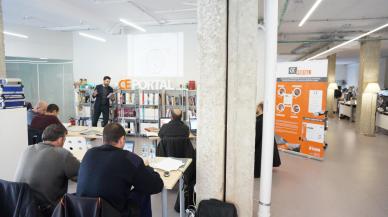

Training in security and digitalisation increases
Training in the automated door sector has sped up. Companies want their professionals to increase their knowledge, both technical and theoretical, in disciplines such as electricity, electronics, fittings, and regulations such as the Technical Building code, the Directive on Machines or the Regulations on Construction Products. But they are also committed to expanding their knowledge on comprehensive security and digitalisation. Experts from Aprimatic, Temeyco, Stel Order and Integra sti (CEportal) unveil the new trends in training.
Read more
Silvia Martínez, Head of Marketing for Aprimatic, says that technical and theoretical training for its workers is essential to the success of any company. “The market is dynamic and requires adapting to the new technologies that emerge; therefore, we are committed to ongoing training for our staff, as part of the strategic plan to keep them motivated, updating their knowledge and preparing them to face new challenges”.
Albano Palacios, Commercial Director with Temeyco, says that a good technical professional in the industry must have a wide range of knowledge. “They must be a professional in locksmithing, which is already a merit in itself, but they must also be familiar with electricity and electronics, to be able to understand the manuals of the various equipment that they may handle; which also plays an essential role in the production of the documentation required to issue the declaration of conformity”.
Carlos Márquez, Technical Director of Integra sti (creator of CEportal), highlights some of the main issues that should be covered by the training “the security requirements for the conformity and EC marking of commercial, industrial, garage doors and barriers and automatic pedestrian doors in the manufacture, installation, maintenance and updating operations”.
Elvira Carrasco, Head of Marketing and Communication with Stel Order, considers that “one of the challenges for training in industrial sectors is adapting to the digital era”. And she adds that “ongoing training in new technologies for employees, especially the more senior staff, leads to an optimisation of the company resources”.
According to Carrasco, “nowadays companies’ main challenge is to connect purchasers with their products or services, and to involve employees in this commercial process. Therefore, training in this sector must focus on adapting to the digital world, to blend the workers’ talents with the new company management and document tools”.
How professionals are trained
Silvia Martínez says that “the Aprimatic team receives training on technical knowledge and on regulations applicable to doors, such as the Technical Building code, the Directive on Machines or the Regulations on Construction Products”. “Aprimatic also provides training for its clients with courses focusing on technical knowledge of the product and the applicable regulations. These courses are valid to prove the staff’s training for those clients who wish to obtain the Aenor certificate”.
Carlos Márquez explains that the professionals at Integra sti increase their preparation by “attending training courses and analysing the directives, regulations and harmonised standards applicable to these products”.
Albano Palacios points out that “we regularly provide training on the electronics of the equipment at our Temeyco facilities, with staff from our regular supplier; and regarding regulations and directives, we provide short courses for our clients”.
Elvira Carrasco tells us that at Stel Order they assume the change towards the digital transformation. And in this regard, “we train our professionals with courses, lectures or congresses; and we promote ongoing training by offering schedule flexibility or training in areas other than one's own, in addition to rewarding self-directed training”.



